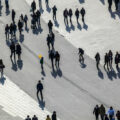Cultural revival of Yiddish and its cultural significance
Cultural revival of Yiddish and its cultural significance
After a decline in the 20th century, explore the remarkable Yiddish cultural revival and its profound cultural significance in our latest article.
Cultural revival of Yiddish and its cultural significance
In the intricate web of global languages and cultures, Yiddish stands out as a phoenix rising from the ashes. Once the predominant language of Central and Eastern European Jews, Yiddish faced a dire decline in the 20th century, confronting the tragic events of the Holocaust and broad cultural shifts. Yet, the 21st century has heralded an inspiring revival of this language, revealing its profound significance in the modern era.
Yiddish has always been more than just a means of communication. It is a guardian of Jewish culture, tradition, and heritage. But by the close of the 20th century, the language had lost much of its prominence, overshadowed by traumatic historical events and changes in societal dynamics.
A modern-day revival
The cultural revival of Yiddish in the new millennium is nothing short of astounding. This revival is marked by a growing interest from within and beyond the Jewish community, driven by the unyielding efforts of dedicated enthusiasts, academics, and institutions.[1] [2] Tel Aviv University stands as a prime example, advocating for the language’s rich cultural tapestry and offering comprehensive resources to foster its growth.[3] [4]
Notably, Dr. Ruthie Abeliovich and others have made great strides in preserving the Yiddish heritage. Their focus on seminal works, such as those by the celebrated Yiddish author Sholem Aleichem, provides invaluable insights into the language’s soul.[5]
Additionally, the world of arts vibrates with the echoes of Yiddish. Visionaries like Joshua Sobol champion Yiddish theatre, emphasising its potency as an instrument against fascism and as a platform for articulating universal themes.[6]
Humour in Yiddish: a lens into culture
Embedded in Yiddish is a unique brand of humour that offers a lens into Jewish identity. From Yiddish phrases and their playful semantics to the comedic stylings of icons like Jackie Mason, Yiddish humour is a vibrant manifestation of Jewish culture. It makes light of life’s adversities and serves as a testament to the community’s resilience. The infusion of Yiddish in songs and literature further showcases its comedic brilliance.[7]
The larger picture: Yiddish as a symbol
The rekindling of Yiddish transcends its linguistic boundaries. It represents the rejuvenation of Jewish identity and culture. As we see Jewish comedy come alive with Yiddish undertones, it paints a vivid picture of the Jewish diaspora’s experiences and traditions.[8]
Moreover, this resurgence is emblematic of a broader message to the world: the paramount importance of preserving languages and traditions. It serves as a rallying cry for communities globally to cherish their unique linguistic and cultural identities.[9]
A tapestry of resilience
The cultural revival of Yiddish is not just a linguistic endeavour. It is a heartwarming tale of resilience, an ode to a community’s heritage, and a tribute to an indomitable spirit. As we witness Yiddish step out from history’s shadows and into contemporary relevance, we are reminded of its timeless legacy.
Ultimately, cultural revival of Yiddish serves as a beacon of hope, illuminating the beauty of cultural diversity and the richness of human civilisation.
Learn more about religion and society on the EARS Dashboard
Sources
[1] Opinion | Yiddish Is Having a Moment – The New York Times
[2] TAU Expands Study Programs For Yiddish Language, Culture Due To Popular Demand – I24NEWS
[3] Teaching Yiddish Modernism in Tel Aviv – Tablet Magazine
[4] Yiddish revival gains momentum as Tel Aviv University introduces new program
[5] Preserving Heritage through Sholem Aleichem | Tel Aviv University
[6] Art Against Fascism: Joshua Sobol on the Radical Possibilities of Yiddish Theater | In geveb
[7] How can you define Jewish humor? – opinion – The Jerusalem Post
[8] “A Language I Come Home To”: Yiddish in the Jewish Diaspora | Folklife Magazine





